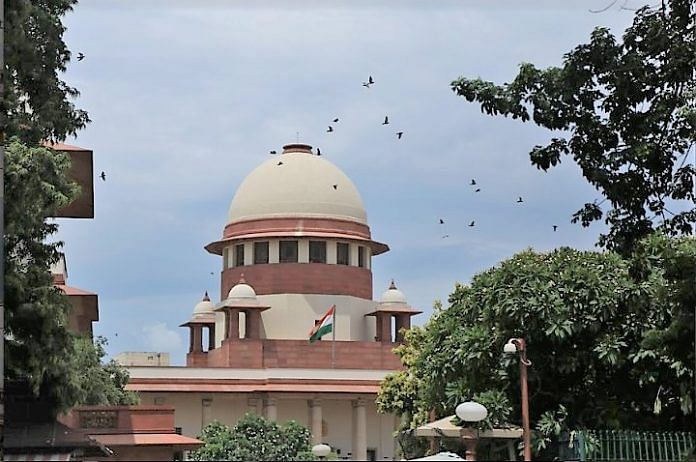The verdict cleared a major hurdle cited by the Centre in granting reservation in promotion of SC/ST govt employees.
New Delhi: The Supreme Court Wednesday paved the way for grant of quota for promotions in the government jobs to SCs and STs, holding that the states were not required to “collect quantifiable data” reflecting the backwardness among these communities.
The verdict cleared a major hurdle that was cited by the central government in granting reservation in promotion to its employees belonging to the Scheduled Castes (SC) and Scheduled Tribes (ST).
The matter had travelled to a five-judge constitution bench, which declined the demand to refer it to a seven-judge bench to reconsider its 2006 judgement that had put certain conditions for granting quota benefits in job promotions for SC/ST employees.
The apex court clarified that there was no need to revisit its 12-year-old verdict in the M Nagaraj case which had said that the states were bound to provide quantifiable data on the backwardness of SC/ST, the facts about their inadequate representation in government jobs and the overall administrative efficiency, before providing them quota in promotions.
The bench headed by Chief Justice Dipak Misra said the conclusion arrived at in the Nagaraj case that the states have to collect quantifiable data showing backwardness of SCs and STs was “contrary” to the nine-judge bench judgement in the Indra Sawhney verdict of 1992, popularly known as Mandal Commission case.
“Thus, we conclude that the judgment in Nagaraj does not need to be referred to a seven judge bench. However, the conclusion in Nagaraj that the state has to collect quantifiable data showing backwardness of the Scheduled Castes and the Scheduled Tribes, being contrary to the nine-judge bench in Indra Sawhney is held to be invalid to this extent,” the bench, also comprising Justices Kurian Joseph, Rohinton F Nariman, S K Kaul and Indu Malhotra, said.
Justice Nariman, who penned the 58-page unanimous verdict, said that SCs and STs were the “most backward or the weakest of the weaker sections of society” and presumed to be backward.
The bench, which said that “efficiency of administration” has to be looked at every time promotions are made, said there was no need to revisit the part of judgement in Nagaraj case which applied the “creamy layer test” to SCs and STs.
It said the whole object of reservation was to see that backward classes of citizens move forward so that they may “march hand in hand with other citizens of India on an equal basis”.
“This will not be possible if only the creamy layer within that class, bag all the coveted jobs in the public sector and perpetuate themselves, leaving the rest of the class as backward as they always were,” it said.
“This being the case, it is clear that when a court applies the creamy layer principle to Scheduled Castes and Scheduled Tribes, it does not in any manner tinker with the Presidential List under Articles 341 or 342 (dealing with SC and ST) of the Constitution of India,” the bench said.
The court also noted that eight of the nine judges in the Indra Sawhney judgement had applied the ‘creamy layer’ principle as a facet of the larger equality principle.
“However, when it comes to the creamy layer principle, it is important to note that this principle sounds in Articles 14 and 16(1), as unequals within the same class are being treated equally with other members of that class,” it said.
The bench said it did not think it necessary to go into whether Parliament may or may not exclude the creamy layer from the Presidential Lists contained under Articles 341 and 342.
It said that when Articles 14 (equality before law) and 16 (equality of opportunity in matters of public employment) were “harmoniously interpreted” along with other Articles 341 and 342, it was clear that Parliament would have the complete freedom to include or exclude persons from the Presidential Lists based on relevant factors.
The apex court also dealt with the submissions advanced by Attorney General K K Venugopal who had urged the bench to lay down that proportion of SC and ST to the population of India should be taken to be the test for determining whether they were adequately represented in promotional posts.
“According to us, Nagaraj has wisely left the test for determining adequacy of representation in promotional posts to the states for the simple reason that as the post gets higher, it may be necessary, even if a proportionality test to the population as a whole is taken into account, to reduce the number of Scheduled Castes and Scheduled Tribes in promotional posts, as one goes upwards,” the court said.
“Thus, we may make it clear that quantifiable data shall be collected by the state, on the parameters as stipulated in Nagaraj (supra) on the inadequacy of representation, which can be tested by the courts. We may further add that the data would be relatable to the concerned cadre,” it said.
The bench also referred to its another 2006 verdict of a constitution bench in which then Chief Justice K G Balakrishnan had held that ‘creamy layer’ principle was “inapplicable” to SCs and STs as it was merely a principle of identification of backward class and not applied as a principle of equality.
“We do not agree with Balakrishnan, CJ’s statement in Ashoka Kumar Thakur that the creamy layer principle is merely a principle of identification and not a principle of equality,” the bench said.-PTI



